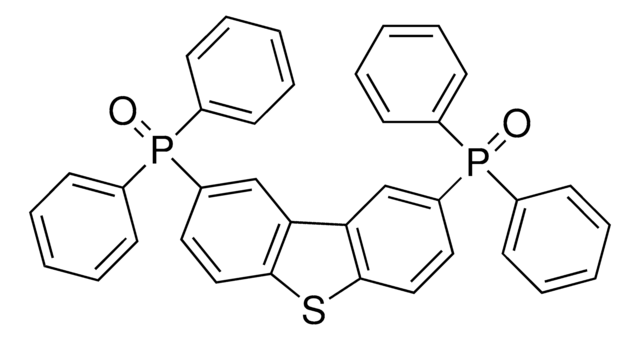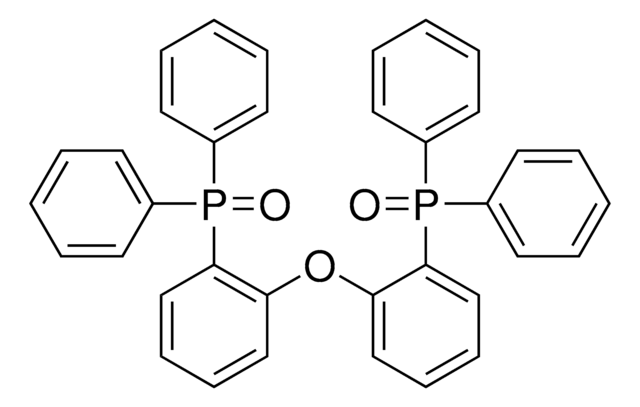701874
1,3-Bis(N-carbazolyl)benzene
97%
Synonym(s):
1,3-Di(9H-carbazol-9-yl)benzene, 9,9′-(1,3-Phenylene)bis-9H-carbazole, N,N′-Dicarbazolyl-3,5-benzene, mCP
About This Item
Recommended Products
Quality Level
Assay
97%
form
solid
mp
173-178 °C
λmax
292, 338 nm
fluorescence
λem 345, 360 nm in THF
Orbital energy
HOMO 6.1 eV
LUMO 2.4 eV
OLED Device Performance
ITO/NPD/mCP/BCPO:FIr6 (8%)/TAZ/LiF/Al
ITO/NPD/mCP/BCPO:FIrpic (8%)/TAZ/LiF/Al
SMILES string
c1cc(cc(c1)-n2c3ccccc3c4ccccc24)-n5c6ccccc6c7ccccc57
InChI
1S/C30H20N2/c1-5-16-27-23(12-1)24-13-2-6-17-28(24)31(27)21-10-9-11-22(20-21)32-29-18-7-3-14-25(29)26-15-4-8-19-30(26)32/h1-20H
InChI key
MZYDBGLUVPLRKR-UHFFFAOYSA-N
Related Categories
Application
Signal Word
Danger
Hazard Statements
Precautionary Statements
Hazard Classifications
Eye Dam. 1 - Skin Irrit. 2 - STOT SE 3
Target Organs
Respiratory system
Storage Class Code
11 - Combustible Solids
WGK
WGK 3
Flash Point(F)
Not applicable
Flash Point(C)
Not applicable
Personal Protective Equipment
Choose from one of the most recent versions:
Already Own This Product?
Find documentation for the products that you have recently purchased in the Document Library.
Articles
In this article, we demonstrate that bis-styrylbenzene derivatives show promising characteristics for very low lasing thresholds and discuss the design considerations for organic lasing molecules.
Since their discovery, organic light emitting devices (OLEDs) have evolved from a scientific curiosity into a technology with applications in flat panel displays and the potential to revolutionize the lighting market. During their relatively short history, the technology has rapidly advanced, and device efficiencies have increased more than 20-fold, approaching the theoretical limit for internal quantum efficiencies.
Our team of scientists has experience in all areas of research including Life Science, Material Science, Chemical Synthesis, Chromatography, Analytical and many others.
Contact Technical Service


iridium(III) 97%](/deepweb/assets/sigmaaldrich/product/structures/309/053/0823f035-245c-433d-b033-2eca2d931c67/640/0823f035-245c-433d-b033-2eca2d931c67.png)



![N-([1,1′-Biphenyl]-4-yl)-9,9-dimethyl-N-(4-(9-phenyl-9H-carbazol-3-yl)phenyl)-9H-fluoren-2-amine ≥97%](/deepweb/assets/sigmaaldrich/product/structures/334/842/a358db6a-5ec8-4c88-902f-856ed7d79fb6/640/a358db6a-5ec8-4c88-902f-856ed7d79fb6.png)

